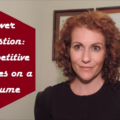For many years recruiters have said that recruiting is like dating. Although this is a lighthearted approach, there is some truth to this claim. If recruiting is like dating, then so too is job hunting.
Although this may be a simplistic analogy, it may help to put some perspective around your job search journey. Job hunting is a daunting task, but by looking at it through a more humorous frame, it may help to alleviate some of the stress. I get it, some of you might be saying “but dating is a daunting task as well.” Though this may be true for some, I hope you find that dating is at least a little bit more enjoyable than job hunting.
6 Ways Job Hunting is Like Dating
- Know what you’re looking for. As I’ve mentioned in previous posts, if you don’t know what it is you’re looking for, how will you know that you’ve found it? As an example, in the dating world, you may be looking for a long-term relationship or a short-term, casual relationship. This is similar to your job search. It would be the difference between a permanent and a contract position.
- The medium you use. Using online sources is quintessential to both job searching and dating. That said, another critical medium is your own network. You can almost think of this like being set up on a blind date.
- Looks good on paper. Once you’ve read through numerous job ads, you will decide to which roles you wish to apply. Similarly, as recruiters sift through countless resumes, they too will decide which applicants they wish to speak with. This will all be based on each parties’ criteria for pre-selecting a potential match. Once a potential match is identified, then an initial screen is scheduled. In the dating world, this could be a coffee meeting. In the job search world, this could be a telephone interview.
- Interview. You can think of this as the courtship phase. Courting in dating may take a much longer time than the interview stage in your job search. That said, you still want to make sure that you are presenting the best version of yourself. Making sure that you look your best and that you say the right things are just as important as being honest and authentic. Keep in mind, this courtship phase is a two-way street. You should be interviewing the potential employer as much as they are interviewing you.
- Probationary Period. Similar to the “dating exclusively” phase of your courtship, your probationary period begins when you start with the new organization. It typically will last about three months from the time you start the new role. During this time you are “feeling each other out” to ensure that what was presented during the Interview stage (or courtship stage) is true to life. It is for this reason that it is critical that you are authentic and truthful during the interview stage.
- Full-Time, Permanent Employment. Once you have passed the probationary period, you would be considered a permanent employee. Keep in mind, while in the probationary period, you too should be confirming that the employer is the right fit for you as well. At this point, you are officially “going steady.” As a point of note, although this stage may not be relevant for contract opportunities, it is still critical to be authentic during the interview stage and during the contract term. The role may lead to a permanent opportunity or even future contracts.
Final Thoughts
Much like in dating, it is important that you broaden your horizons in terms of the types of organizations to which you wish to apply. There are a number of organizations that are very popular and “sexy.” As a result, there will be a lot of competition for roles within such organizations. By keeping an open mind and looking for potential in different organizations, you will be broadening the playing field. As such, you may even find an opportunity outside of the popular organizations which may be a better fit for you.
I hope you found this post helpful. If you have any additional insights, or would like to share your experience, I’d love to hear from you.
Until next time, happy hunting!
For personalized advice, check out the services section here.








